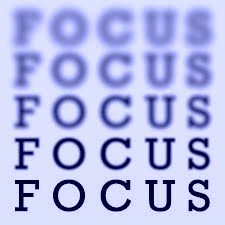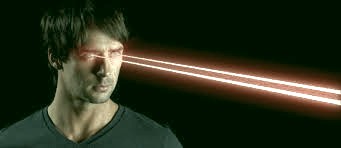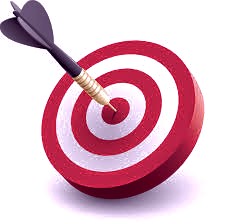It has always impressed me when I see someone who can keep it together in the midst of chaos, as in Rudyard Kipling’s poem If, which starts “If you can keep your head when all about you are losing theirs and blaming it on you…”. I’ve long noticed my tendency to get distracted or jarred by minor happenings which didn’t seem to affect anyone else. I often have great difficulty recovering from interruptions and getting back to the original task. Am I just “too sensitive”, or could I have undiagnosed ADD or ADHD?

When I began to learn about vision improvement, I also began paying more attention to how I pay attention. Vision and attention are closely related, which I wrote about here. Even if I want to remain laser-focused on understanding something, my attention can be easily yanked away. It’s like the Shiny Object Syndrome that people joke about, except I’m not drawn to something interesting or exciting, I’m drawn to what could be dangerous or a problem. It seems I want to avoid the trouble before it gets too close, or fix it. Way too much of my attention was tied up in being watchful years ago. I was acting like I lived in a war zone!
One of the key components of vision improvement, as taught by Dr. Bates, is central fixation, or seeing what you’re looking directly at most clearly, while still remaining aware of what’s in your periphery. I wrote about central fixation here. Studying this fundamental concept, I realized I had been using my vision like a laser or a sniper, focusing hard (too hard!) on one single thing at a time, like a predator focusing on her prey, shutting out the periphery completely. This level of attention may be necessary for short periods of time, in a crisis situation. Over-using it can exhaust your nerves, and your visual system. Hyper-vigilance is not good for the body long-term.

Recently I started reading “The Open-Focus Brain”, by Les Fehmi, which was recommended to me by a friend. (Yes, Open Focus is the same phrase Jacob Liberman used to describe a healthy relaxed method of looking in his vision improvement classic “Take Off Your Glasses And See”.) Les Fehmi discusses the different levels of attention, hard forced focus and relaxed easy focus, and gives some exercises to encourage an open focus way of interacting with your environment. I’m looking forward to exploring these more and experimenting with them.
My over-focusing habit probably developed in childhood, since I wanted so desperately to learn everything I could, and to do everything right. Then when I was put in eyeglasses at age 5, my over-focusing tendency was reinforced, since I was naturally discouraged from looking at my periphery outside the glasses frames. And wearing distance glasses when I was reading, which I did every free minute I had, even more firmly fixed this pattern in place. I had some major un-learning to do!

The bullseye picture reminds me that the center is only a point, literally nothing — the periphery gives it context and meaning. I do peripheral vision exercises almost every day, sometimes simply noticing what’s to the sides without moving my eyes away from looking straight ahead. If I over-focus and only use my central vision, I can feel myself getting tense. On the other hand, remaining aware of the periphery feels more relaxing. In fact, just adding awareness of what’s to the sides, while still keeping my focus to the front, calms me and seems to add a level of depth to what I’m seeing, rather than pulling my focus away from it. I am learning to manage my attention and to use an easy gentle manner when I focus, which I know is helping my vision.
get help on our Facebook Group!

I wore strong glasses, then contact lenses, from age 5 into my 40s. While making many mistakes, eventually l learned how to improve the way I use my eyes and to see in a more relaxed, healthy manner. It is my pleasure to coach others to do the same. Visit me at https://NancyLNeff.com.

Jatin, hello. If you are asking if I can see clearly now, the answer is yes. My vision is best in natural light, and when I’m happy and relaxed. (This is true for just about everyone.) I can do what I need to do without glasses, which feels like great freedom when I grew up with such strong thick ones.
Willeke, I love it when someone has had a similar visual experience to mine, so that we can learn from each other. Yes, I was somewhat shocked to admit how much I was NOT looking around when I was younger, and especially when I was still wearing glasses. And I love your idea of taking Les Fehmi’s book on holidays, where the purpose is to relax and have fun! I look forward to hearing what you discover. Thanks so much for your thoughts.
Now you can see clearly tell me plz
hello Nancy,
I just got aware of my superfocus lately, and thought it would be good to me to be more open for the periphery. And now I am reading your article, I very much rescognize what you wrote. As a child I was Always busy, with interest , learning very eagerly and not being very much aware of my surroundings. Something new to investigate , in relation to my vision process.
thank you for sharing! And also for the tip reading Les Fehmi’s book. I will take the book with me on holidays 🙂
I will let you know if something interesting comes to me!
Bye, Willeke B. Holland
Jenny, thanks! I am so glad when my own experience is helpful to others. I really appreciate your letting me know. 🙂
Nancy, I just wanted to let you know how much I appreciate all of your posts. It seems like every one of them relates to my vision in some way. I learn or realize something new each time.